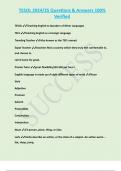TESOL 2024/25 Questions & Answers 100%
Verified
TESOL ✔✔Teaching English to Speakers of Other Languages
TEFL ✔✔Teaching English as a Foreign Language
Traveling Teacher ✔✔Also known as the TEFL nomad
Expat Teacher ✔✔teachers find a country which they truly feel comfortable in,
and choose to
call it home for good.
Private Tutor ✔✔great flexibility,$20-$30 per hour!
English language is made up of eight different types of word ✔✔Noun
Verb
Adjective
Pronoun
Adverb
Preposition
Conjunction
Interjection
Noun ✔✔A person, place, thing, or idea
verb ✔✔Verbs describe an action, or the state of a subject..An action word....
Eat, sleep, jump,
, TESOL 2024/25 Questions & Answers 100%
Verified
watch.
adjective ✔✔A word that describes a noun...Pretty, ugly, expensive.
Pronoun ✔✔A word that takes the place of a
noun...........I/we/you/she/he/it/they
Adverb ✔✔A word that describes a verb..with reference to place, time, manner
or
degree..Quickly, slowly (time)Very, thoroughly (degree)
Preposition ✔✔A word that shows the relationship of a noun or pronoun to
another word.They
can exist as single words, or as prepositional phrases which contain several
words together, for
example:
In, on, under, behind, in front of.
Conjuction ✔✔words that are used to join together sentences, ideas, phrases or
clauses....
connecting words such as and,but, or
Interjection ✔✔small comments that have specific meanings often caused by
strong emotions.
A word that expresses emotion.....Oh dear, uh oh, huh
, TESOL 2024/25 Questions & Answers 100%
Verified
concrete objects ✔✔things which can be held or touch
Proper nouns ✔✔are the particular names of people/places/organizations, and
come with a
capital first letter, for example, 'Jack', 'London', and 'Asia'. Proper nouns will
usually be taught
after regular nouns, as they require additional instruction to capitalize the first
letter.
acting out the verb ✔✔showing video clips, or clear images
verbs can be organized ✔✔Action
Stative
Transitive
Instransitive
Auxiliary
Modal
Regular
Irregular
Action Verbs ✔✔are used to describe actions and movements. They're also
known as 'dynamic
verbs',........Speak, play, work, eat, go.
, TESOL 2024/25 Questions & Answers 100%
Verified
Stative Verbs ✔✔These verbs describe a state instead of an action - they're often
associated with
verbs covering thinking, feeling, sensing or owning. Examples include:
Like, hate, want, see, hear, believe, imagine, remember and appreciate.
Transitive verbs ✔✔are those which are accompanied by a direct object, for
example:
The phrase "I love..." has to be followed by something; "I love puppies/ice-
cream/my mother".
Just the phrase "I love" on its own doesn't make sense.
Intransitive verbs ✔✔don't need to be accompanied by an object to make sense,
for example:
"She laughed." or "We talked." are full sentences that don't need any extra
information.
Auxiliary Verbs ✔✔are used to support the 'main' or most dominant verb in a
sentence.three
most common auxiliary verbs in English are "be", "do" and "have", and they are
often used for
grammatical reasons, rather than introducing a direct change to a sentence's
meaning.
He is reading a book.




